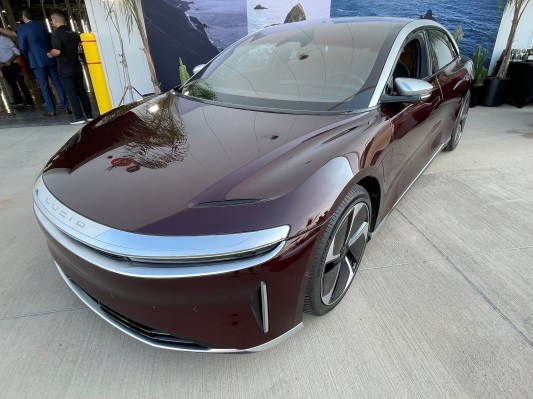Lucid Group is the latest automaker to up the price of its electric vehicles.
The company announced Thursday alongside its first-quarter earnings report that it was raising prices of the variants of its luxury Air sedan, beginning June 1. The price hikes push the base price of the Air sedan as much as 13%.
All existing reservation holders will not experience price hikes, the company said, noting that updated pricing for Canada will be made public on June 1. Considering that Lucid disclosed it has 30,000 reservations for the Air, it will be awhile before the company sees the benefit from these raised prices.
The Air Grand Touring will increase about $15,000 to a cost of $154,000; the Air Touring will cost $12,400 more at $107,400; and the Air Pure will go up $10,000, to $87,400. The Lucid Air Grand Touring Performance model, the price of which was announced two weeks ago, will remain the same at $179,000, the company said. All of these prices are for base models, so the final price tag could be much higher for customers.
Other automakers like Tesla and Rivian have announced similar increases in price for their electric vehicles, blaming ongoing supply chain issues from the pandemic and Russia’s invasion of Ukraine, as well as inflation, for the rising costs from suppliers, which are now being passed on to the consumer. In Rivian’s case, the company was initially going to raise prices for reservation holders as well, but quickly reversed that decision.
“Similar to many companies in our industry, we continue to face global supply chain and logistics challenges, including Covid-related factory shutdowns in China. We are working closely with our suppliers to mitigate the impact of disruptions,” Sherry House, Lucid’s CFO, said in a statement. “While any extended disruptions could result in an impact to our production forecast, today we are reiterating our 12,000-14,000 vehicle production forecast for 2022 based on the information we have at this point combined with our mitigation plans.”
Lucid’s guidance for deliveries remain unchanged, and the company said it still expects Air Grand Touring Performance deliveries in June, as well as Air Touring and Air Pure expected later this year. The Project Gravity SUV remains on target to begin production in the first half of 2024, according to Lucid’s CEO and CTO Peter Rawlinson.
Last quarter, Lucid lowered its guidance from 20,000 units, a figure it promised in its Q3 earnings.
The EV startup said it is experiencing strong demand with more than 30,000 customer reservations as of today, which represents potential sales of $2.9 billion, the company said. Whether it will be able to keep up that demand with its current price jump is another question, but presumably those who are rich enough to buy a Lucid vehicle anyway will see an extra $12,000 as merely pocket change.
The company also noted that it recently signed a deal in which the government of Saudi Arabia committed to purchase up to 100,000 electric vehicles from Lucid over the next 10 years. This deal, which was announced last month, follows a loan agreement from the Saudi government that the companies entered into in late February, according to Lucid’s 10-Q filing with the Securities and Exchange Commission. The agreement commits Saudi Arabia to provide loans of up to $1.4 billion to Lucid, provided the government can reduce that availability of capital under certain circumstances.
Lucid Motors Q1 2022 financials
Lucid Motors closed out the quarter with $57.7 million in revenue, which the company says is driven mainly by customer deliveries of 360 vehicles over the three months ending on March 31. That is up massively from the $313,000 the company pulled in during the same quarter last year. It’s also more than analysts’ expectations of $53.43 million, according to Yahoo Finance estimates.
Lucid’s balance sheet shows nearly $5.4 billion of cash on hand, which the company says is sufficient to fund operations well into 2023. That aligns with analyst expectations around easing of supply chain issues in the second half of the year, which will allow the company to ramp up production and potentially stick to its longer-term growth roadmap, including expanding its production line-up and overseas availability.
